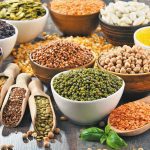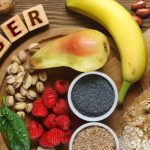An upset stomach can be caused by many factors, such as food poisoning, stomach flu, stress, or medication. It can result in symptoms like nausea, vomiting, diarrhea, constipation, gas, bloating, or cramps. Depending on the cause and the severity of your symptoms, you may need to see a doctor or take medication to treat your condition. However, some foods can also help ease your discomfort and speed up your recovery. In this blog, we will discuss what foods are good and bad for an upset stomach, based on the latest research and expert advice.
Foods to Eat for an Upset Stomach
The foods that you should eat when you have an upset stomach depend on the type of symptoms you have. Here are some general guidelines for different scenarios:
- For constipation: Constipation is when you have difficulty passing stools or have fewer than three bowel movements per week. To relieve constipation, you need to increase your intake of fiber, which can soften your stools and stimulate your bowel movements. Fiber-rich foods include vegetables, fruits, whole grains, legumes, nuts, and seeds1. Some examples are green beans, carrots, broccoli, apples, pears, prunes, oatmeal, quinoa, and bran cereal2. You should also drink plenty of water and fluids to prevent dehydration and help move the fiber through your digestive system.
- For diarrhea: Diarrhea is when you have loose or watery stools more than three times a day. Diarrhea can cause dehydration and electrolyte imbalance, so you need to replenish your fluids and minerals. A simple way to do this is to follow the BRAT diet, which stands for bananas, rice (white), applesauce, and toast (white)3. These foods are bland and easy to digest, and they can help bind your stools and reduce the frequency of diarrhea. You can also drink sports drinks or electrolyte drinks to restore your hydration and electrolyte levels2.
- For nausea and vomiting: Nausea is when you feel sick or queasy in your stomach, and vomiting is when you throw up the contents of your stomach. Nausea and vomiting can be triggered by various factors, such as motion sickness, pregnancy, chemotherapy, or infection. To ease nausea and vomiting, you should avoid eating solid foods until you feel better. Instead, you can sip on clear liquids or ice chips to prevent dehydration4. You can also try ginger or chamomile tea, which has anti-nausea properties25. Once you can tolerate solid foods again, start with bland and soft foods like crackers, toast (white), rice (white), or chicken broth4.
- For cramps: Cramps are painful contractions of your abdominal muscles that can occur due to gas, indigestion, menstrual pain, or irritable bowel syndrome (IBS). To relieve cramps, you should avoid foods that can trigger gas production or irritate your gut lining. These include animal products (especially red meat), fatty foods (such as fried foods), processed foods (such as fast food), spicy foods (such as chili peppers), dairy products (if you are lactose intolerant), caffeine (such as coffee), alcohol (such as beer), and carbonated drinks (such as soda)6. Instead, you should eat foods that can relax your muscles and reduce inflammation. These include beans (which contain magnesium), fruits (which contain potassium), Metamucil (which contains psyllium husk), prune juice (which contains sorbitol), vegetables (which contain antioxidants), peppermint tea (which has antispasmodic effects), licorice tea (which has anti-inflammatory effects), or flaxseed oil (which has omega-3 fatty acids)6 .
Foods to Avoid for an Upset Stomach
As mentioned above, some foods can worsen your symptoms or delay your recovery when you have an upset stomach. Here are some general foods that you should avoid or limit when you have an upset stomach:
Acidic foods: Acidic foods can irritate your stomach lining and cause heartburn or acid reflux. These include citrus fruits (such as oranges), tomatoes (and tomato-based products), vinegar (and vinegar-based products), chocolate (and cocoa products), and pineapple.
Dairy products: Dairy products can cause lactose intolerance in some people who lack the enzyme lactase to digest lactose (the sugar in milk). This can result in gas, bloating, diarrhea, or cramps. If you are lactose intolerant or sensitive to dairy products, you should avoid milk, cheese, yogurt, ice cream, butter, cream, sour cream, and other dairy products. You can opt for lactose-free or plant-based alternatives instead, such as almond milk, soy milk, rice milk, oat milk, coconut milk, cashew cheese, tofu, or vegan ice cream.
Gluten: Gluten, a protein found in wheat, barley, rye, and some oats can cause celiac disease in some people who have an autoimmune reaction to gluten. This can damage the lining of the small intestine and cause symptoms like diarrhea, constipation, bloating, gas, cramps, weight loss, anemia, fatigue, or skin rashes. If you have celiac disease or gluten sensitivity, you should avoid gluten-containing foods, such as bread, pasta, cereal, crackers, cookies, cakes, pies, pastries, beer, soy sauce, and other processed foods that may contain gluten. You can choose gluten-free alternatives instead, such as rice, quinoa, buckwheat, corn, millet, amaranth, teff, sorghum, or gluten-free oats.
FODMAPs: FODMAPs are carbohydrates that are badly absorbed in the small intestine and fermented by bacteria in the large intestine. This can cause gas, bloating, diarrhea, or constipation in some people who have irritable bowel syndrome (IBS) or functional gastrointestinal disorders (FGIDs). FODMAPs include fructose (found in fruits, honey, and high-fructose corn syrup), lactose (found in dairy products), fructans (found in wheat, garlic, onion, and artichoke), galactan (found in beans and lentils), polyols (found in sugar alcohols and some fruits and vegetables). If you have IBS or FGIDs, you may benefit from following a low-FODMAP diet, which involves eliminating high-FODMAP foods for a period of time and then reintroducing them gradually to identify your triggers. You can consult a dietitian for guidance on how to follow a low-FODMAP diet safely and effectively.
Conclusion
An upset stomach can be unpleasant and uncomfortable, but it can also be treated with the right foods. Depending on your symptoms and their causes, you may need to eat more or less of certain foods to ease your discomfort and speed up your recovery. In general, you should eat foods that are bland, soft, easy to digest, hydrating, and anti-inflammatory. You should avoid foods that are spicy, fatty, acidic, dairy-based, gluten-containing, or high in FODMAPs. However, these are only general guidelines and not a substitute for medical advice. If your symptoms are severe or persistent, you should see a doctor or a dietitian for diagnosis and treatment.




